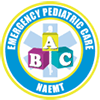Raven EMS Education Program ManualRAV-430 Emergency Pediatric Care (EPC) Course
 | The Emergency Pediatric Care (EPC) course focuses on critical pediatric physiology, illnesses, injuries and interventions to help EMS practitioners provide the best treatment for sick and injured children in the field (NAEMT, 2024). |
Course Description
This course presents the scope of knowledge in pediatrics that defines paramedic pre-hospital pediatric practice. The course stresses critical thinking skills to help practitioners make the best decisions for their young patients. It is an ALS course. Therefore, the material assumes a minimum BLS background in pre-hospital pediatric care. EPC is appropriate for EMTs, paramedics, emergency medical responders, nurses, nurse practitioners, physician assistants, and physicians. EPC is accredited by CAPCE and recognized by NREMT. This course can be used as a basic pediatric education course, or it can be used to compliment and augment the AHA PALS or ARC PALS course (Combined course library, 2024; NAEMT, 2024). The NAEMT EPC Course:
- Provides essential pediatric continuing education for all EMS practitioners, including EMTs, advanced EMTs, paramedics, nurses, physician assistants, and physicians
- Meets the requirements of the National Registry’s National Continued Competency Program (NCCP) for recertification
- Promotes critical thinking, the foundation to providing quality care and formulating a differential diagnosis of the pediatric patient
- Includes the Pediatric Assessment Triangle (PAT) as a tool to obtain a first impression in the pediatric assessment
- Emphasizes the importance of family-centered care
Prerequisites
Course Options
The following EPC courses are offered to address the needs of providers:
- Provider Course: 16-hour course for EMTs, paramedics, nurses, physician assistants, and physicians. This course may be offered as a classroom course, or a hybrid course where students take 8 hours of course content online followed by 8 hours in the classroom. Upon successful completion of the course, students receive a certificate of completion, a wallet card recognizing them as EPC providers for 4 years, and 16 hours of CAPCE credit.
- Online Module: 8-hour online module that covers the didactic portion of the EPC course. Upon successful completion of the module, students receive a certificate of completion and 8 hours of CAPCE credit.
- Refresher Course: 8-hour course for individuals who have successfully completed the 16-hour EPC or PEPP provider course within the past four years. Upon successful completion of the course, students receive a certificate of completion and 8 hours of CAPCE credit.
Course Topics
- The pathophysiology of the most common critical pediatric emergency issues, and critical thinking skills to help practitioners make the best decisions for their patients
- Application of the Pediatric Assessment Triangle (PAT), a tool to help EMS practitioners rapidly and accurately assess pediatric patients
- The importance of family-centered care
- Understanding and communicating with children
- Airway management, breathing and oxygenation
- Cardiac emergencies
- Recognizing child abuse and neglect
- Hypoperfusion and shock
- Newborn resuscitation
- Topics covered in EPC that are not covered in PALS:
- Pediatric Growth, Development, and Assessment
- Trauma
- Medical Emergencies
- Toxicological Emergencies
- Pediatric Maltreatment
- Obstetric, Newborn Care, and Congenital Defects
- Children with Special Healthcare Needs
- Mental Health
- Skills: Intubation & Medication Administration
- Simulations: Behavioral Health, Hypothermia, Blunt Trauma, Sepsis, Febrile Seizure, Child Maltreatment, Medical Emergencies, Burns
Change Log (7.25.916.C430)
| Date | Author | Description of Change | Citations |
|---|
| 2025-01-12 | Becker, T.Theron Jack Becker | Moved this course to its own page from x.xx.916. | |



